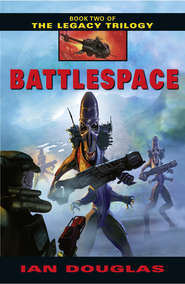По всем вопросам обращайтесь на: info@litportal.ru
(©) 2003-2025.
✖
Star Marines
Настройки чтения
Размер шрифта
Высота строк
Поля
Recharge would take just over forty-five minutes.
4
12 FEBRUARY 2314
Battlespace
1156 hrs, GMT
In the four and a quarter hours since the huntership had boosted that first small planetoid toward Earth, the rock had traveled almost 31 million kilometers which, on the vaster scale used to measure distances across something as large as a solar system, translated to a little more than one and a half light-minutes. HELGA Platform 3, in solar orbit 132 million kilometers from the Sun, currently and by chance, was five light-minutes from the rock that was its first target.
At their current respective positions, rock, HELGA Three, and Earth formed a triangle with slightly unequal legs—five light-minutes from HELGA to the rock, six from the rock to Earth, four and a half from Earth to HELGA. In physics, one watt of power delivered in one second equaled one joule. The HELGA laser—actually a battery of twenty-five lasers fired as an array—had an output of some 50 billion joules. The three-second beam, then, carried 150 thousand megajoules, the equivalent of 750 twenty-megaton nuclear warheads.
Some five minutes after Kali triggered the HELGA discharge, then, the kilometer-wide rock was struck by the laser energy streaming out from the distant military base between the orbits of Earth and Venus. The beam itself was invisible, of course; there was no air to ionize, no mist of dust or water vapor in the vacuum of space to call the beam into visibility. The tumbling mountain of rock, however, abruptly flared sun-hot, as a brilliant, blindingly intense star-point of white light ignited at the planetoid’s limb.
In fact, the targeting was less than perfect; tiny uncertainties about the rock’s precise position and vector meant that the strike was not dead-center on the target, and, though the three-second beam was tracking along the asteroid’s calculated inward-bound path, it actually connected with the rock for less than half a second before the rock tumbled out of the beam.
That half-second, however, was sufficient to pour the wrath of over a hundred detonating twenty-megaton fusion bombs into one very small section of the rock’s surface. The asteroid was of the type designated a carbonaceous chondrite—the most common of planetoid bodies—and some twenty percent of its make-up was actually water ice. One side of the asteroid was still at the temperature of deep planetary space—nearly one hundred degrees below zero Celsius—while the other half in one dazzling instant attained a temperature close to that of the surface of the Sun.
White-hot plasma erupted from the planetoid’s surface, stabbing into space like a rocket’s jet. An instant later, the temperature differential shattered ice and stone alike, and the rock mountain disintegrated into an expanding cloud of debris, ranging in size from sand grains to chunks the size of a house.
And, of course, every piece of debris, from dust mote to ten-meter boulder, continued on a vector only very slightly modified by the impact’s plasma thrust, still moving at over seven million kilometers per hour.
Commodore Edward Preble
Outbound from Mars
1215 hours
The virtual conference had continued uninterrupted throughout the morning hours, though some participants had dropped out to attend to other duties, while new ones logged on. Such conferences, Garroway thought, often took on a kind of life of their own, changing, growing, dynamic, as the individual cells left the system and new ones joined.
Garroway himself had logged out in order to concentrate on writing orders for the RST, but then returned in time to watch, with nearly four hundred other men and women, the results of the first firing of the HELGA Three array. Participants were attending from all over the Earth, with the heaviest concentrations in Washington, New York, and Stockholm, the capitals, respectively, of the United States, the North American, and the World Unions. Perhaps ten percent were in space—on Earth’s Moon, on Mars or Phobos, in Earth orbit, or in various spacecraft scattered from the Jovian moons to the orbit of Mercury.
Not all of those last could participate in any meaningful, real-time manner, of course. The fourteen-minute time lag between a signal being sent from the Preble and an answer being received was annoying; the Jovian system was on the far side of the Sun at the moment, over six AUs distant, with a total there-and-back signal time of ninety-eight minutes. Admiral Hargreave, CO of the Union’s First Fleet, was currently at Caltexto, and effectively out of the conversation, though his icon was showing.
As it was, Garroway was only able to participate in the background of the conference, his words and ideas coming through almost a quarter hour after the statements that had elicited them. At the moment, though, the attention of most of the participants was focused on the schematic that showed events unfolding in battlespace somewhat closer to Mars than to Earth, in the general region between the Inner Belt and the orbit of Mars. Sensor drones and fighters in the area had picked up images of the first of the asteroidal missiles suddenly brightening to intolerable brilliance, then vanishing. Garroway had seen those images before they reached Earth, and the Earth-bound observers’ reaction hadn’t reached him until seven minutes after that.
The cheers and shouts, however, clearly marked the moment when they saw those scenes as well.
“Gentlemen!” General Armitage was calling over the chaos. “Ladies, gentlemen! The celebration is premature!”
“But we’ve destroyed the first missile, General!” Senator Kenichi Kondo said. “We’ve proven that it can be done!”
“One missile … and there currently are eight more still en route to Earth. And there will be more, unless we stop the intruder. Otherwise, that bastard will keep throwing rocks faster than we can burn them down.”
“But how—”
“People,” General Dumont said, “we simply must implement General Garroway’s suggestion. There is no other alternative.”
“Redirect the HELGA platforms to fire on the Intruder?” Senator Fortier said, her voice conveying her shock at the idea. “That is tantamount to planetary suicide!”
“The data, Madam Senator, suggest that it will be planetary suicide if we simply try to play catch-up with the Intruder.”
“There is also the option, General, of trying to communicate with those people. We have the language … or a language … from our studies of the Singer, and from AI contacts with Hunter ships.”
“The Prometheus attempted to signal the Intruder,” Dumont told her. “You saw how well they textened.”
“Then we should try again!”
“Senator Fortier, right now these ‘people’ as you call them are doing their level best to destroy all life on our home planet! I submit that this is not the time to try to use diplomacy!”
“And if these beings are as advanced and as powerful as you suggest, General, perhaps diplomacy is our one and only hope!”
Damn the woman, Garroway thought. Someone put a lid on her and shut her the hell up! This was not the time to argue the matter. Whether she realized it or not, the entire human race was engaged in battle at this moment, a battle that very well might determine whether Humankind survived, or became extinct.
On the schematic, the red star marking the position of the Hunter warship winked out, reappearing almost immediately in a new position.
Garroway stared at the new strategic configuration. “Ken!” he called out over the virtual conference link within the Preble’s computer net. “Do you see that?”
“I do,” Rear Admiral Jollett replied. “If we could hold them there. …”
The intruder had just leaped to a new location less than eight hundred thousand kilometers from the Preble, and on a general line with Preble’s course—two and a half light-seconds away, instead of several light-minutes.
“We can,” Garroway said. “At least we can try. Will you back me?”
It was, to say the least, a fascinating problem in international military chain of command.
The battle with the Hunter intruder was being directed from Earth. The three HELGA platforms were under the jurisdiction of the High Guard and Rear Admiral Karen Castellaw, but her bosses were Lieutenant General Armitage, of the Joint Chiefs of Staff of the North American Union, and General of the Union Eva Cortez, of the Joint Chiefs of the World Union.
The governments of the world existed in nested series, like Russian Matryoshka dolls—with the World Union above the North American Union above the government of the United States of America. Technically, the United States Marines, though still in direct U.S. service, “belonged” to the North American Union. Technically, too, the World Union did not have its own military, but relied on the military of the NAU to provide protection and order. According to the World Constitution, the WU civilian authority superceded the NAU and gave the orders; in practice, the NAU military had the guns, and, therefore, under the control of the NAU and U.S. civil authorities, the power.
Who was really in charge, who gave the orders, had never, until now, been tested. Clearly, Senator Fortier thought she and the WU civil authority did; there was no president of the World Union; leadership was vested in a rotating speakership within the WU Senate. Fortier was not the current Speaker. That privilege was currently vested in Senator Ivan Danikov, of the Russian Union, but Danikov had not yet logged on to the discussion, and Fortier had assumed control of the battle.
Or so she thought. The actual orders were being given by Armitage and Cortez.
But on an even more practical level, it was Garroway and Jollett who were going to have to make the necessary call. Jollett was the second-in-command of the NAU’s First Planetary Fleet; Admiral Hargreave was in command, but currently out of the loop at Caltexto.
Garroway, CO of 1MIEU, was the ranking Marine officer on the Preble. Jollett outranked him, but technically could not command Marine units unless they were part of the First Fleet’s TO&E … and 1MIEU was not currently assigned to his command.
But Jollett and First Fleet could give orders to High Guard units … like HELGA Three.
“You want me to redirect HELGA Three’s targeting routine,” he said.
“There are two XELs in Mars orbit,” Garroway pointed out. “You could fire them as well. I suggest you order all three to fire. We don’t know what the effect on the Intruder is going to be.”
“Agreed.” He sounded glum. “You know, Clint, this is not a career-enhancing situation.”
“Fuck that,” Garroway said with a bluntness calculated to shock, to startle. “You and I are both at the apex of our careers, anyway. Where else can we go? Except retirement.”











